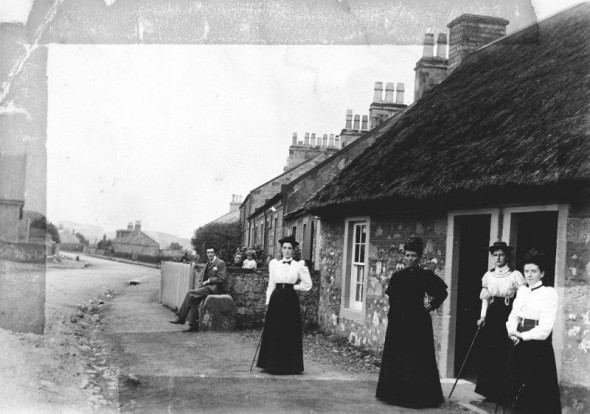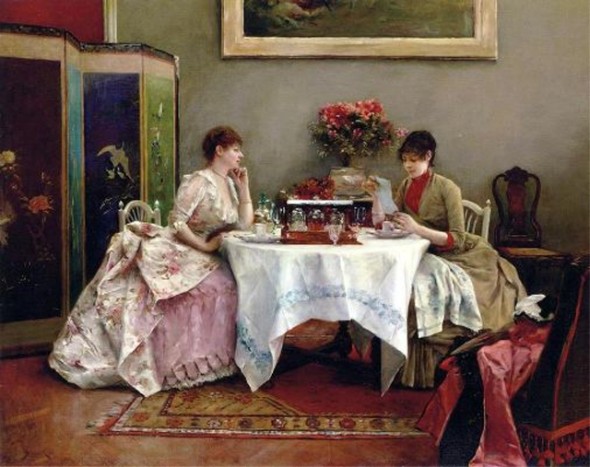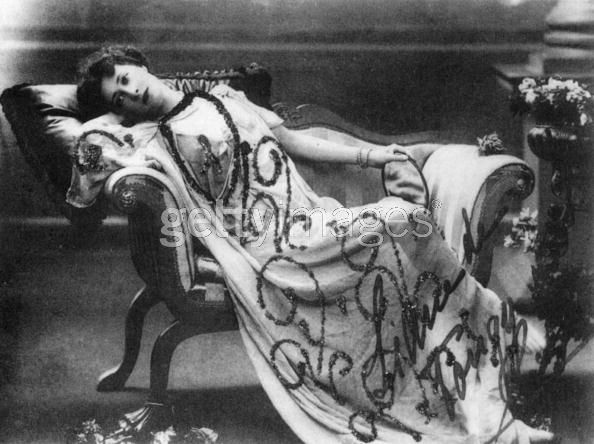
The country town in England serves as well to exploit all these national differences as though it were England under a microscope. The classes are as distinctly marked as though they wore uniforms. At the base of the social pyramid are the agricultural laborers earning from $2.50 to $3.25 a week; fifty per cent of the laborers in England earn twenty-five shillings a week or less. A fact worth remembering when we revise our tariff! Then the farm servants and house servants of the small gentry, earning, the men from $90 to $250 a year, the women from $60 to $125 a year; then the shopkeepers and their assistants and employees; then the richer merchants and mill or factory owners, and ranking with them the local professional men, lawyers, doctors, Dissenting ministers, land agents, and the like; next come the gentlemen farmers and landed proprietors, and the clergy of the Church of England; and finally the county gentlemen and the neighboring nobility, with the lord lieutenant of the county, often a great noble, as the official and political apex.
The manufacturer, mill-owner, and the like receives of course both social and official recognition according to his success and his wealth. As we have noted elsewhere, the successful brewer or manufacturer often crowns his career by being made a peer, when he leaves his own class and enters another. The same is true of the great lawyer, the successful politician, and so on. I may be mistaken, but I believe the physician is the only representative of success in the professions who thus far has failed to reach the dignity of the peerage.
…[T]he homogeneity of the race makes for mutual understanding and solidarity. In spite of the social gradations we have noted, the common grounds of intercourse are nowhere so many as here: witness the cricket, the hunting field; the dog and horse and agricultural and flower shows; the friendly and even confidential relations between the landowner and his farmers, bailiffs, woodsmen, trainers, jockeys, huntsmen, and so on. There are no false distinctions, only real distinctions, so the English claim, and no one but a fool or an ape cares to break them down. On ground where men can meet without self-consciousness, they do meet; but why should men who meet because they play cricket, or ride to hounds, or breed dogs, or love flowers, wish to meet in the drawing-room, or at the dinner-table, when they have not the same experience, the same opportunities, or common tastes?
…The very machinery of government in the town itself runs more easily for this fact. Going from small to great, the Parish is the smallest unit in England, having a Parish Council, or, if very small, a Parish Meeting. Groups of Parishes form the Union, the Union being the unit for the administration of the Poor Law. Unions again, where a Borough is concerned, are divided into “Borough” and “District,” i. e. Town and Country. Their respective Councils deal with roads, sanitary matters, etc., etc. Groups of Unions form the County, which deals with main roads, education, lunatics, and so on. In some cases a Union is partly in one County and partly in another; then it is divided for County purposes.
The English town of Northbridge is governed as to water, lighting, roads, sanitary matters and the like, by a Mayor, and a Town Council over which he presides. The Town Councillors are elected by the voters of ‘the Borough, who consist of all property owners, practically all occupiers of any taxable property, and lodgers who pay a certain specified sum for their lodgings. Even the sons in a family, twenty one years of age or over, and living at home, must become lodgers in their own homes, they must have rooms of their own in the house, which they may lock up against their parents, and they must, as has been said, pay a certain sum therefor, viz., ten pounds unfurnished, to entitle them to vote.
Women, too, may vote for the Councillors, but not for Parliamentary candidates. Married women may not vote, and other women, spinsters and widows, must be property owners, or lodgers paying a certain sum, and coming under the same rules as to their right to vote as men. This privilege is exercised in certain places, and in certain political crises appealing particularly to women very largely. In other places and at other times scarcely at all. It is not a matter than can be settled by giving figures, since the numbers differ widely. In New Zealand, where the women may vote, but where they have not been obliged to fight for the privilege, they care very little for it, and seldom exercise their right. To what extent the novelty of the franchise may influence the women voters in England it is as yet too early to decide. For the moment it is evident that the majority make comparatively little use of their right to the ballot.
At this present writing there are 1,141 women on Boards of Guardians; 2 on Urban District Councils; 146 on Rural District Councils; and 615 on Education Committees. The Councillors elect so many Aldermen, and from their own number the Alderman and Councillors elect the Mayor. In the case of Northbridge, the town is divided into wards for the purposes of elections, but this is not so in all towns. When a Town Councillor is elected an Alderman, it creates a vacancy in his ward, and there follows another election. These elections take place every three years. The Aldermen are elected for six years, and half of them retire every three years. This system, however, only dates from 1882, the year of the passing of the Corporation Act by Parliament.
The Schools are controlled: (1) by Parliament, (2) by the County Council, (3) by local managers. Parliament is represented by the Board of Education, whose inspectors visit and report on all schools, and the government grant of money is only paid to such schools as satisfy the government requirements as to efficiency.
The County Council, through its Education Committee, pays the teachers, fixes their salaries, and provides all equipment, such as books, black-boards, furniture, coal, and so on. The government grant is paid at the rate of so much per child to the County Council, who make up the deficiency by levying a tax over the whole county. The tax in this particular county in 1907 was, for elementary education five pence halfpenny in the pound, and for secondary education one-half pence in the pound, or, for both taxes, twelve and a half cents on every five dollars.
The local managers are six for each school, divided as follows: four Foundation Managers, appointed under the trust deeds of the several schools; one appointed by the Town Council, and one by the County Council.
In Northbridge there are four schools, though one, the Blue Coat School, a Foundation school, is very small and rather an exceptional case. The three schools which practically serve the town are: the school in the Parish of the High Town, the school in the Parish of the Low Town (these are merely geographical distinctions), which are both Church of England schools, and the school of the Roman Catholic Parish. In very many towns there are Council schools directly under popular control, but in Northbridge, which is a staunch Tory town, in a staunch Tory county, there are none.
Practically all of the appointments to the local subordinate offices are made by the Town Council, and are not elective, the auditor being one of the few office-holders who is elective. In the matter of licenses for public houses, a much vexed question just now, the licenses are granted annually by the local justices to old license holders, but in the case of applications for new licenses, or of a refusal to renew an old one, the local justices refer the matter to the County Justices, or the Court of Quarter Sessions, who deal with such questions through the County Licensing Committee. The local justices also grant licenses for buildings where stage plays may be acted and the like.
Justice, in a borough or town like Northbridge, is administered by Borough Justices, who are mostly local tradesmen and professional men; they deal with small offences at Petty Sessions. More serious offences are dealt with at the Borough Quarter Sessions, presided over by a Recorder, who is a barrister and a paid official, with a jury. Still more serious offences are sent up to the County Town, in this instance the Town of Shrewsbury, and tried before a Judge of Assize.
In the County District, the Magistrates as a rule are local gentry. They sit in the town itself for Petty Sessions, and in the County Town for Quarter Sessions, when, in place of a Recorder, they select one of their own number as chairman, who is also unpaid.
He is, however, usually a barrister, and I know of one instance where a gentleman studied law merely to fit himself to occupy this position in his own neighborhood creditably. Here again the most serious offenders, as with Borough offenders, are tried at Assizes. The offender himself in some cases may demand to be tried by the higher court. These unpaid magistrates are suggested by the Lord Lieutenant, and appointed by the Lord Chancellor. The Lord Chancellor is an officer of the government which may at the moment be in power, the Lord Lieutenant of the County is not necessarily so. When these gentlemen happen to belong to different political parties, it is hinted that the Lord Chancellor sometimes appoints magistrates without consulting the Lord Lieutenant.
This is not often done, and the arrangement on the whole works without friction. To be a County Magistrate is the ambition of many men, and the gift of this distinction is rarely if ever mischievously bestowed. It is not supposed to be a question of party politics, but of personal worth, and there is no complaint that the party in power misuses this privilege. These amateur magistrates make mistakes, and Mr. Labouchere and Truth devote many paragraphs to their shortcomings, but the system works so well that there are seldom complaints from the class who are judged by them, and over whom they exercise control. It is generally held by those who come before them that more leniency may be expected from these unpaid magistrates, than would be shown by paid magistrates.
The clergy of the Church of England are State officials, for marriage and funeral purposes, and together with the church wardens, control church property. They are also ex-officio chairmen of their respective vestries, but vestry meetings nowadays are of historical rather than practical interest. They are often also, under certain trust deeds, trustees of the schools and Parish charities and not infrequently ex-officio chairmen of the Trustees, or School Managers.
The clergy of the time of Swift, Sterne, and Addison were not precisely of the gentleman class. They were placed below the salt, and oken mated with the upper servants. There seems to be a falling off again now in the quality of the inferior clergy. I know of a neighbor’s nurse-maid who is engaged to a curate, and they no longer occupy the position of influence of half a century ago.
It is by no means intended to infer from this statement that the bulk of the clergy are not hard working or without influence. In the country districts they are valuable public servants, and, according to their willingness, lend a hand here, there, and everywhere. But, with many exceptions of course, they receive nowadays more of social rank from their position as clergymen than they bring to that position. One often hears the lament that it is not easy to get a curate who is a gentleman — using that word, of course, in its limited technical sense understood in England. The temptation to men of a certain social grade and of moderate abilities to go into the church is of course great, when thereby they can, without much exertion, become members of a profession which gives them a standing that neither their birth nor their intellectual powers would have won for them in any other way.
~ excerpt from England and the English from an American Point of View by Price Collier (1914)





Comments are closed.